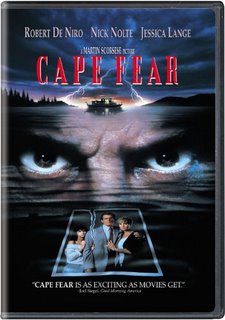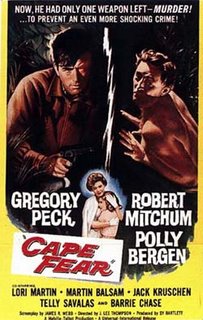

(Not a misprint; I'm talking in plural, like the womens).
For Marie's psycho studies, we had to analyse several films and get some psychological themes from them.
An ideal assignment! I was glad to offer my two cents with this.
First one was Finding Forrester, the next one was Martin Scorcese's 1991 remake of Cape Fear (1962).
Both of these movies are so well-made, and Scorcese's version (or let's say writer Wesley Strick's version) so deeply layered, that it was very disappointing for me to feel that the story is ultimately unprofitable on a philosophical or personal level.
I guess that's a roundabout way of saying that both Marie and I felt a bit like we'd wasted two good hours after watching this. It was certainly exciting, terrifying, plumbed the depths of the human psyche, but ultimately it had nothing to redeem it, not even a protagonist we can sympathise with.
In the behind-the-scenes featurette, Nick Nolte says that it's about stripping away the masks we wear, and sometimes violent suffering is the only way to do that. I guess so, Nick, but I'd prefer to get that message from a film like Sideways, which does it in a much gentler but still powerful way.
Strick's version of Cape Fear is achingly empty of hope. Danielle's voiceover at the end is a message of stoicism, a message of just pressing on.
From a how-to-make-a-movie department, there were some great touches. Layering the Max Cady character as a psychotic, Bible-quoting avenging angel was an interesting touch that made his character really, really scary, as well as his superhuman strength.
Using the original music from 1962 was inspired, but also made the movie idiosyncratic, perhaps too much for mainstream audiences in 1991. However, Scorcese says it was the movie that earned him the most money of all his films.
Psychological themes aplenty here, though:
- Fear
- Obsession
- Sexuality
- Repression
- Deception
- Dysfunctional families
Because we were so dissatisfied with the remake, we thought we'd check out the original. What a difference 30 years makes!
Not that we really liked the original that much, but it's very telling about the acceptable standards of culture at the time. The original can't even say the word "rape", yet the remake shows some pretty gruesome verbal and visual violence (nothing explicit though, except Robert de Niro taking a bite out of Illeana Douglas' cheek).
The original was much simpler and more straightforward than the remake, but the acting was top notch. Robert Mitchum especially is such a great actor. Was, rather. Shame.
However, again with this one I wondered why? It's another entertaining, terrifying wild ride, but at the end the only message I get out of it is that some people are so bad they should be locked in a cage forever. What's so great about that?
Maybe I should stop looking for the transcendent or the uplifting in every movie, and just see how well they've designed their roller-coaster ride. However, knowing a tiny bit about how hard it is to make a movie, I really wonder what's in some people's heads who just go crazy over this sort of story.

